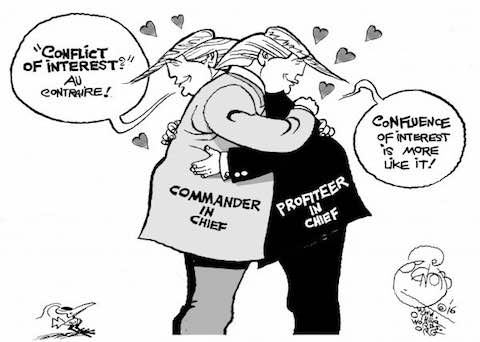- MENU
- HOME
- SEARCH
- WORLD
- MAIN
- AFRICA
- ASIA
- BALKANS
- EUROPE
- LATIN AMERICA
- MIDDLE EAST
- United Kingdom
- United States
- Argentina
- Australia
- Austria
- Benelux
- Brazil
- Canada
- China
- France
- Germany
- Greece
- Hungary
- India
- Indonesia
- Ireland
- Israel
- Italy
- Japan
- Korea
- Mexico
- New Zealand
- Pakistan
- Philippines
- Poland
- Russia
- South Africa
- Spain
- Taiwan
- Turkey
- USA
- BUSINESS
- WEALTH
- STOCKS
- TECH
- HEALTH
- LIFESTYLE
- ENTERTAINMENT
- SPORTS
- RSS
- iHaveNet.com: Politics

Draining the Swamp How-To Guide (Khalil Bendib / OtherWords.org)
By Gary D. Bass and Danielle Brian
If Donald Trump cares about unrigging the system and draining the swamp like he's said, here are five things he can do.
When President-elect Donald Trump talked about “draining the swamp,” it evoked the way Bernie Sanders talks about how the system is rigged. Many Americans believe -- with good reason -- that powerful corporate lobbyists, elites, and other moneyed interests control the levers of government.
Trump has pledged to refrain from nominating corporate lobbyists for political positions, to restrict appointees from lobbying for five years after leaving their government posts, and to do something about conflicts of interest arising from his own extensive business interests.
But in order to truly drain the swamp, he’ll need to do far more. Here are five additional elements we hope Trump includes in his plan:
Start with the top
Trump needs to turn over his family businesses into a true blind trust managed by an independent trustee with no ties to his family. The trustee should dispose of any business enterprises behind the blind trust wall and invest the new assets without any information going to Trump himself.
Cabinet appointees, too, need to be free of conflicts of interest in order to effectively serve the national interest.
Crack down on political appointees with financial conflicts
Trump should issue an executive order on his first day in office cracking down not on lobbyists, but on all those with financial conflicts of interest. Focusing on lobbyists simply allows them to game the system by de-registering.
The executive order should also include restrictions on all political appointees from using government positions to curry favor with past and future employers.
That means there should be a ban on private gifts or compensation to people going into the administration. And appointees involved in policy decisions should be barred from working for any private entity that’s materially benefited from those policies.
Stop the money game
Along with money in politics, Trump needs to do something about what we call “money in policy.” Between elections, billions of dollars are spent each year by powerful interests in order to influence policies, contracts, and other decisions at federal agencies. The next administration should limit this type of government capture.
Similarly, Trump should push for strict standards to keep special interests from dominating federal advisory committees tasked with making policy recommendations.
End the sweet deals for contractors
The incoming administration should reform and revamp the government’s purchasing process to make it fair, transparent, and accountable to the public.
Under the current system, wealthy special interests are ripping off taxpayers by getting special access to lucrative government contracts. This pay-to-play system means average citizens and small businesses are not competing on a level playing field.
Make government more open and participatory
Trust in government, particularly in Congress, is practically nonexistent. One way to rebuild this trust is to engage the public, and not just powerful elites, in decision-making.
This starts with modernizing our voting systems to make it easier for every eligible person to cast a ballot. It also means putting an end to partisan and racial gerrymandering. At the same time, there needs to be greater transparency in government, more resources for oversight, and new ways to engage people in government decision-making.
“Swamp draining,” however, is meaningless without a foundation in democratic values. All of the above efforts must be guided by protecting and advancing core principles of American democracy, such as a free press, an independent judiciary, and the constitutional presumption of equal protections under the law.
There are powerful moneyed interests with a stake in keeping the status quo. But President-elect Trump was voted into office by Americans who want change. A commitment to good government principles is essential to making that happen.
Danielle Brian is Executive Director of the Project On Government Oversight (POGO). Gary D. Bass is an affiliated professor at Georgetown University’s McCourt School of Public Policy and founder of OMB Watch.
Article: Courtesy Otherwords.org.
AMERICAN POLITICS
WORLD | AFRICA | ASIA | EUROPE | LATIN AMERICA | MIDDLE EAST | UNITED STATES | ECONOMICS | EDUCATION | ENVIRONMENT | FOREIGN POLICY | POLITICS
Receive our political analysis by email by subscribing here
AMERICAN POLITICS
WORLD | AFRICA | ASIA | EUROPE | LATIN AMERICA | MIDDLE EAST | UNITED STATES | ECONOMICS | EDUCATION | ENVIRONMENT | FOREIGN POLICY | POLITICS
Politics: "Draining the Swamp How-To Guide"